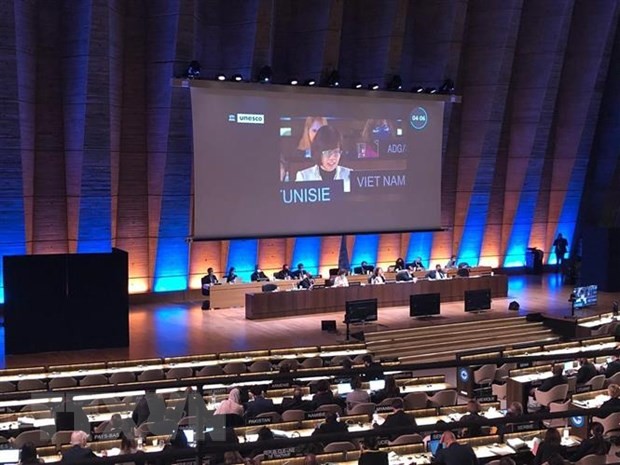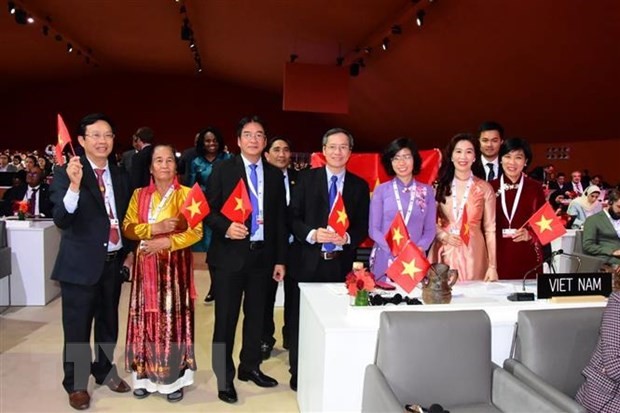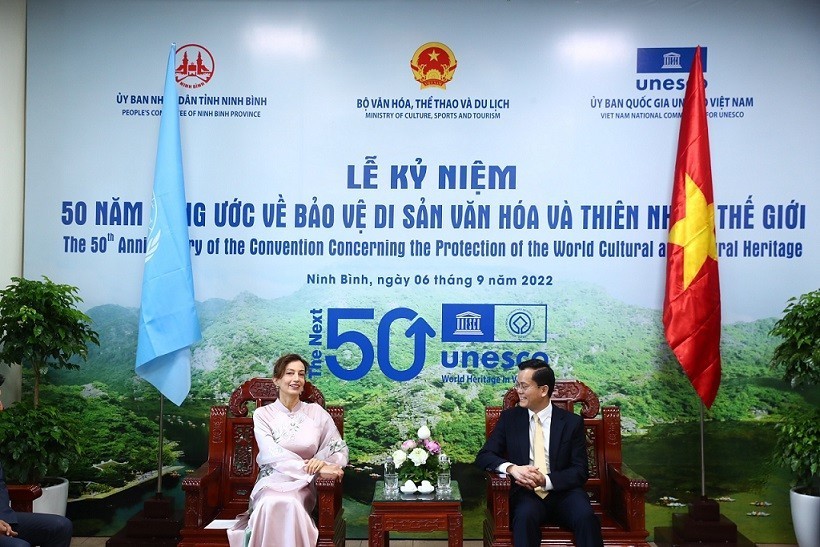
Multilateral cultural diplomacy helps Vietnam shine at UNESCO: Ambassador to UNESCO
Latest
 |
| Multilateral cultural diplomacy helps Vietnam shine at UNESCO: Ambassador Le Thi Hong Van speaks during a plenary session of the UNESCO General Assembly. (Photo: VNA) |
Taking to the Vietnamese media, Ambassador Van noted that the first official visit to Vietnam by UNESCO Director-General Audrey Azoulay in September this year and the visit to UNESCO by Vietnamese Prime Minister Pham Minh Chinh in November 2021 contributed to implementing the Memorandum of Understanding (MoU) on cooperation for the 2021-2025 period and lifting the Vietnam- UNESCO relations to a new height.
The Ambassador highlighted UNESCO has committed financial and technical support for Vietnam in implementing the education development strategy for the 2021-2030 period, preserving and promoting heritage values, and developing sustainable cultural and tourism industries, responding to climate change, protecting biodiversity, and ensuring security of water sources for sustainable development.
 |
| Multilateral cultural diplomacy helps Vietnam shine at UNESCO: Ambassador Le Thi Hong Van (third, right) and the Vietnamese delegation at the UNESCO session to recognize the Cham Art of Pottery as an Intangible Cultural Heritage in need of urgent protection. (Photo: VNA) |
She stressed that cultural diplomacy has contributed to promoting cultural values and the image of the country and people of Vietnam, especially progressive and beautiful human views and worldviews of Vietnam through spreading the ideological and character values of late President Ho Chi Minh and prominent figures honoured by UNESCO such as poets Nguyen Dinh Chieu and Ho Xuan Huong.
Cultural diplomacy has also helped effectively mobilise UNESCO's knowledge, resources and assistance to preserve and promote the country's heritage values, thus supporting sustainable development for the people and localities, she said.
It is considered an important component of Vietnam’s comprehensive and modern diplomacy, Ambassador Van added.
2022 also marks new milestones in promoting multilateral diplomacy of Vietnam at UNESCO, the ambassador noted.
Vietnam was elected to the Intergovernmental Committee of the UNESCO Convention for the Safeguarding of Intangible Cultural Heritage for the 2022-2026 term with the highest number of votes, affirming the international trust and support for Vietnam's contribution and governance capacity at global multilateral institutions, she noted.
Its active and responsible contributions to promoting dialogue, cooperation and consensus, and finding satisfactory solutions to issues of common concern in the context of the complicated international situation were recognised and appreciated by leaders of UNESCO and countries, the diplomat added.
Vietnam’s engagement and contribution at high level to shaping global policy and strategic issues is another success of its cultural diplomacy at UNESCO, helping affirm Vietnam's international position and prestige, Ambassador Van stressed.
 |
| Multilateral cultural diplomacy helps Vietnam shine at UNESCO: Chairman of the National Commission for UNESCO Ha Kim Ngoc had a working session with UNESCO Director General Audrey Azoulay in Ninh Binh province on September 6. (Photo: WVR/Tran Huan) |
The country has advantages in implementing its cultural diplomacy, she noted, affirming that the guidelines and policies of the Party and State on the role of culture and cultural development are comprehensive and clear, in line with the country's reality and the trend of the times.
Vietnam needs to continue effectively implementing UNESCO's global initiatives on transforming education and culture in association with sustainable development, ethics in human's intelligence, open science, and sustainable management of water resources and oceans in the context of climate change to catch up with new global cooperation trends, improve legal frameworks and improve institutional and human capacity, the ambassador said.
She also underlined the necessity for Vietnam to proactively introduce policies, share good experiences and examples, and support other developing countries in improving their capacity in terms of culture, science and education.









